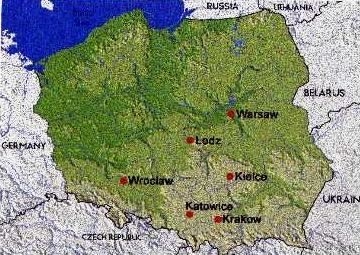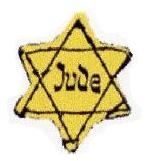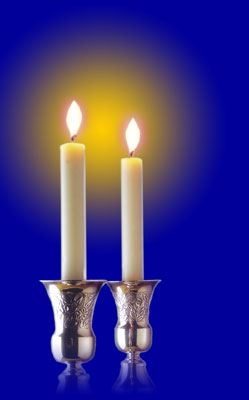 |
| A map of Poland |
Lola Fuchs is a citizen of Boston, as well as a hero for many people. She is a survivor of the Holocaust. Because of this, she is now Shomer-Shabbos. This means that every Friday night she has dinner with her family. She recites the Kiddush over a glass of grape juice instead of wine, she recites the Hamotzi on a challah, and recites another prayer while lighting candles. She can’t work every Friday night and Saturday. The Holocaust isn’t the only hardship that Lola survived. Two years ago, she was afflicted with a mild stroke. She has recovered for the most part, though it impacted the movement of her left hand and leg. Occasionally, she needs to use a cane.
 |
| A Star of David, also known as a Jewish Star |
Frania Fuchs gave birth to Lola on July 16, 1921. She was born in Radom, Poland and lived with her mother, her father, Yaacov Fuchs, her sister, Edith, who was five years younger than Lola, as well as her younger sister, Bella. She moved to Crackow, Poland before the war began. In her 70’s, Lola went back to school and got her bachelor of arts degree.
Lola was twenty-three after the war when she moved to Linz, Austria, where she met her late husband, Manny. Soon after she got married, she had Frances, but moved to Jersey City, New Jersey. There she had Jack, who became a nuclear physicist and married. Frances became a doctor and also married.
Surviving the Holocaust was not an easy accomplishment. At the beginning of the war, Lola lived in the Crackow Ghetto with her family. She was moved from concentration camp to concentration camp for a grueling, testing, pitiless, intense and brutal three and one-half years. Before going to the concentration camp, Plaszow, Lola was separated from her parents and younger sister. They died early in the war when she was eighteen years old. Lola was in the concentration camps, Auschwitz, Bergen-Belsen and Mathausen with her sister, Edith. They were together throughout the whole war.
Mathausen was the most memorable concentration camp for the two. Great, as well as horrible, events occurred there. Mathausen was situated in a valley. There were eight hundred scared women in that camp, many of whom had typhoid, a highly contagious fever. Edith was one of the women that caught it. Lola was doing all she could to help Edith fight it off. Sadly, Edith lost hope, and in the middle of the night she said in her dreams, “I won’t make it." Lola, on the other hand, hadn’t given up just yet. That morning she left as early as she could to get in line for a portion of bread and black coffee so that she could feed her sister. Breakfast never came. It was a beautiful morning, making Lola dream of freedom and being able to live as an independent individual, and of the war coming to an end. Suddenly, her dream became reality. She spotted a car with an American flag, followed by many others. At first she didn’t believe what she saw, but her eyes did not deceive her; the American soldiers were coming to the camp. Lola ran back to Edith to tell her this wonderful news. Edith didn’t believe her, but after her struggle to the outdoors, she could hear the excited shouting of the eight hundred women. This marked the beginning of a new life for eight hundred women, as well as a new beginning for eight hundred families. This memorable morning was the fifth day of May 1945, a true May Day.
 |
| shabbos candles |
Because of what my Great Aunt Lola did, she became a hero to me. She taught me true family values by saving her sister. I feel that whoever knows her will get far in life. She shows true family values, the importance of persevering, of not giving up even in the darkest hour, and the importance of always seeing light at the end of the tunnel, no matter how far away it is. She might not have realized it then, but by saving her sister she saved many generations of happy families. Edith married, gave birth to a daughter and later on to triplets, one of whom is my mom. Many people would not be living today if Lola had given up on her sister and on herself. This shows that she is a very strong human being. She survived the Holocaust, beginning at the age of eighteen. She had a very difficult youth. Many teens today would not have been able to do what she did. My Aunt Lola has assumed the role of informing others about this great event in her life. She has written stories and has spoken in public to encourage awareness, something very important if we don’t want history to repeat itself. I know many would like to hide and forget this event, the opposite of what she thinks is right. My aunt also lives in her own apartment. For her age and condition, she is very independent and capable. Thanks to her, I feel that I am a much more aware and better person than I was before I knew her full story. She has impacted my life in a great way with great knowledge. I will cherish this knowledge forever.
Page created on 11/4/2011 12:00:00 AM
Last edited 11/4/2011 12:00:00 AM
